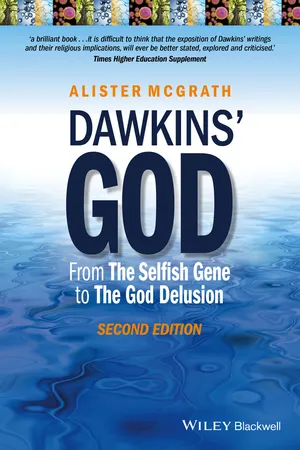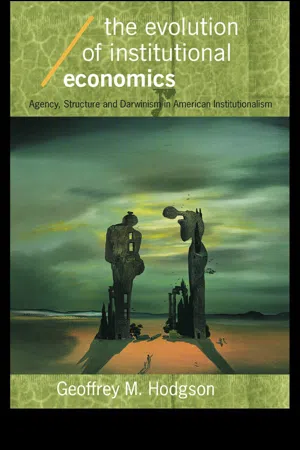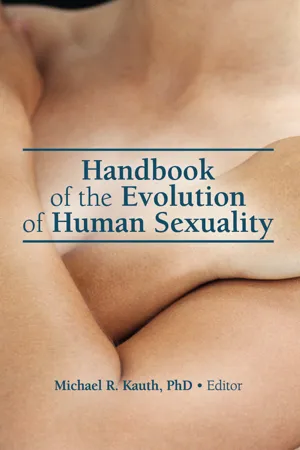History
Darwinism
Darwinism refers to the theory of evolution developed by Charles Darwin, which posits that all species of organisms arise and develop through the natural selection of small, inherited variations that increase the individual's ability to compete, survive, and reproduce. This theory has had a profound impact on the fields of biology, anthropology, and philosophy, shaping our understanding of the natural world and human origins.
Written by Perlego with AI-assistance
Related key terms
7 Key excerpts on "Darwinism"
- eBook - ePub
The Social Meaning of Modern Biology
From Social Darwinism to Sociobiology
- Howard Kaye(Author)
- 2017(Publication Date)
- Routledge(Publisher)
A world ruled by natural selection of random variations seemed to call into question both the beneficence of God, Nature, and the historical process and the status of man and his highest qualities. Christians, Spencerians, Darwinists, Marxists, and Liberals thus found themselves forced to alter, either consciously or unconsciously, Darwin's essential mechanism by transforming science into myth. Regardless of one's political position, the chaos, brutality, and indifference to human concerns seemingly implied by natural selection had somehow to be denied; the massive conflicts and suffering in life that it seemed to suggest had to be minimized to protect a providential metaphysics and the new "natural science" of right living. If the concept of natural selection was the essence of Darwinism, the essence of the debates surrounding Darwinism's human meaning was their anti-Darwinism. To illustrate this point, I will next take a closer look at the phenomenon of social Darwinism in its various manifestations. (For a discussion of the theological responses to Darwinism in England and America, see Moore's [1979] superb work.) Karl Marx, in his previously quoted letter to Engels (Marx 1979, p. 157), was the first of many to charge that Darwin's theory of evolution was largely a projection of bourgeois competitive relations onto the realm of nature. And the danger of such a projection has proved to be as clear to others as it was to Engels: the use of Darwinism as an ideological buttress for competitive capitalism, a tactic which soon came to be known as "social Darwinism." Once the characteristics of bourgeois reality and of its ideological defenses have been transferred to nature, they are then, in Engels's words, "transferred back again from organic nature to history and it is now claimed that their validity as eternal laws of human society has been proved" (quoted in Sahlins 1976, pp - eBook - ePub
- Ana Petrov(Author)
- 0(Publication Date)
- Hollitzer Wissenschaftsverlag(Publisher)
64While the term ‘evolutionism’ usually refers to the field of natural sciences, such as biology, the terminological situation in the social sciences is more complicated. Thus, for social Darwinism it is pointed out that it can mean “as many things as many authors wrote about it”,65 although even this theoretical orientation is frequently researched in analogy with biological evolutionism. Generally speaking, social Darwinism embraces a discourse on the development of human societies that is held to be equivalent to the process of development observed in plants and animals. The origin of social Darwinism is inevitably discussed through a theoretical prism reconstructed from two fundamental sources – Herbert Spencer’s and Charles Darwin’s discourses, often having their similarities and differences as the focus. The debates on the importance and influence of these thinkers are also numerous, as are those considering the origin of certain terms used in both theories. Furthermore, there are approaches that aspire to skip over these debates, and these authors usually point to the problem of a similar basis but different conclusions for the problems analysed.66 Apart from the presenters of equal or different reciprocal influence between Spencer and Darwin, there are authors who negate any possible impact.67 Finally, it should be emphasised that discussion over the relationship between Spencer’s and Darwin’s theories has been present since the very beginnings, i.e. since the publication of Darwin’s famous book On the Origin of Species (1859). Leaving this aspect (whether one of them influenced another, whose influence was more important, if there was an impact at all) aside for the moment, it is unequivocally certain that both of the writers were acquainted with the work of the other,68 - eBook - ePub
Dawkins' God
From The Selfish Gene to The God Delusion
- Alister E. McGrath(Author)
- 2014(Publication Date)
- Wiley(Publisher)
But why Darwin? Why not Karl Marx? Or Sigmund Freud? Each of these is regularly proposed as having brought about an intellectual earthquake, shattering prevailing assumptions and ushering in radical new ways of thinking which lead to the bifurcation of human thought. The theories of biological evolution, historical materialism, and psychoanalysis have all been proposed as defining the contours of humanity come of age. All, interestingly, have been linked with atheism, the movement that some Europeans in the eighteenth and nineteenth centuries hoped might prove to be an intellectual and political liberator. So why Darwin? To ask this question is to open up the issues which so deeply concern Dawkins, and which have such wider implications.To appreciate the contributions of Richard Dawkins to debates about evolutionary theory and the relation of science and religion, we must first contextualize his ideas. This opening chapter is a scene-setter, providing the background against which Dawkins’ ideas about the “selfish gene” and “blind watchmaker” are to be seen. Before we can make sense of Dawkins’ distinctive approach, we need to set him in his proper context, and tell the story of the emergence of the form of evolutionary thought that is often referred to as “Darwinism.”Natural Selection: Charles Darwin
The publication of Charles Darwin’s Origin of Species (1859) is rightly regarded as a landmark in nineteenth-century science. On December 27, 1831, HMS Beagle set out from the southern English port of Plymouth on a voyage that lasted almost five years. Its mission was to complete a survey of the southern coasts of South America, and afterward to circumnavigate the globe. The small ship’s naturalist was Charles Darwin (1809–82). During the voyage, Darwin noted some aspects of the plant and animal life of South America, particularly the Galapagos Islands and Tierra del Fuego, which seemed to him to require explanation, yet which were not satisfactorily accounted for by existing theories. The opening words of the Origin of Species - eBook - ePub
- Geoffrey M Hodgson(Author)
- 2004(Publication Date)
- Routledge(Publisher)
Social Darwinism in American Thought by Richard Hofstadter (1944), where the skills of a great historian were deployed in the ideological war effort against fascism and genocide. However, Hofstadter’s thesis has been systematically challenged by several critics, including Robert Bannister (1979) and Donald Bellomy (1984). In America there were relatively few instances where Darwinism was used to support capitalism, imperialism, racism or war. A more prominent ideological use of Darwinism in the 1880–1940 period was as a justification of progressive reform rather than conservative reaction. Hofstadter had lumped together all sorts of views under the vaguely defined label ‘Social Darwinism’ and failed to note the crucial differences in both analysis and orientation between Darwinism and Spencerism. As Raymond Wilson (1967, p. 93) confirmed: ‘No more than a small handful of American business leaders or intellectuals were “social Darwinists” in any sense precise enough to have a useful meaning.’As a result of these myths, the uncritical modern use of the phrase ‘Social Darwinism’ is imprecise and highly misleading. No adequate consensus exists on the meaning of the term ‘Social Darwinism’ and it has little descriptive value. This is not to deny the important influence of the Darwinian world-view, or the rhetorical significance of its importation into discourses concerning human society. Part of the revolutionary significance and attraction of Darwinism was to require that humankind should be considered as a part of nature. Darwinism also emphasized scarcity and the struggle for life. But the idea that the term ‘Social Darwinism’ represented a coherent doctrine in additional (theoretical or ideological) respects is false.11Broadly ‘evolutionary’ ideas appeared in the works of Henry Maine (1861), Edward Tylor (1871), Lewis Henry Morgan (1877) and several others. Tylor (1871, p. 7) wrote notably that ‘institutions which can best hold their own in the world gradually supersede the less fit ones’. But this was in the context of a non-Darwinian and teleological view of cultural development. They assumed a series of preordained stages through which civilization and culture had to pass, suggesting that history had a definite path or goal. History for them was the progressive unfolding of immanences. While they attempted to erect general theories of cultural development, they failed to produce an adequate causal story of the alleged single-track progress of civilization. Whether describing social development as an evolution from ‘status to contract’ or ‘barbarism to civilization’, these writers registered a common commitment to progress and a limited appreciation of Darwinism (Bannister, 1979; Bowler, 1988; Sanderson, 1990). Some classic evolutionists distanced themselves entirely from Darwin’s work. Passing references to ‘struggle’, ‘fitness’, and even ‘natural selection’ in their books showed the influence of Darwinian or Malthusian terminology, but no deep commitment to Darwinism. - eBook - ePub
- Patrick Spread(Author)
- 2012(Publication Date)
- Routledge(Publisher)
Chapter 4 , some academics seem quite specifically concerned with the formulation of theories which will raise support, or to embellish their theories with features designed to attract support. Karl Marx, a committed revolutionary, not himself institutionalised, blazed a trail in partisan polemic of great intellectual intricacy that has entranced and exasperated generations of theory makers. For the entranced, he also justified intellectual aggression. If belief in the objective truth of natural science is naïve, then taking social theory at face value is absurd.Support-bargaining and social Darwinism
A certain set of theories, all drawing on the Darwinian ideas of ‘survival of the fittest’ and a ‘struggle for existence’, principally concerned with individualism, laissez faire competition, racial dominance, military conquest and the practice of eugenics, became known as ‘Social Darwinism’, with a strongly pejorative sense. The term was used sparingly in academic journals before the Second World War, but its use greatly increased following the publication of Hofstadter's study, Social Darwinism in American Thought , in 1944.74 The term was used by theorists, mostly on the left of the political spectrum, to denigrate the above types of theory. Robert Bannister opens his 1979 book on Social Darwinism in the period 1859–1920 with the sentence: ‘Social Darwinism, as almost everyone knows, is a Bad Thing.’75The controversy over Social Darwinism is illustrative of the process of intellectual support-bargaining. The theory of natural selection was used to give scientific backing and hence apparently incontestable realism to theories about society. The widespread support developing for Darwin's theory and its apparent social implications eroded support that might otherwise have been attracted to theories of social cooperation. Advocates of the latter developed a conception of the Darwin-associated theories which they labelled ‘Social Darwinism’. Social Darwinists were identified as a group of bigots pushing ideas of capitalism and militarism under the guise of natural science, to the advantage of capitalists and militarists, but to the detriment of the interests of ordinary people. - eBook - ePub
- Michael R. Kauth(Author)
- 2013(Publication Date)
- Routledge(Publisher)
A Brief History of the Theory of Evolution: Context, Concepts, Assumptions, and Sexuality Michael R. Kauth, PhD Michael R. Kauth is Clinical Psychologist, Southeast Louisiana Veterans Health Care System, New Orleans, LA, and Assistant Professor, Department of Psychiatry & Neurology, Tulane University School of Medicine. Address correspondence to: (E-mail: [email protected]). SUMMARY. A brief history of evolutionary theory illustrates its long development and sociopolitical context. Major theoretical concepts in evolutionary theory are introduced that lay the groundwork for more detailed discussion in later texts. Two incarnations of evolutionary theory–sociobiology and evolutionary psychology–are described in some detail. Criticisms of these ideas are reviewed and evaluated. Evolutionary psychology, with its emphasis on sexual selection theory, has proven to be a rich approach, generating many new insights into human sexuality. doi:10.1300/J056v18n02_02 [Article copies available for a fee from The Haworth Document Delivery Service: 1-800-HAWORTH. E-mail address: Website: < http://www.HaworthPress.com > © 2006 by The Haworth Press, Inc. All rights reserved.] KEYWORDS. Darwin, evolution, adaptation, sexual attraction, theory, heterosexual, homosexual Nothing in biology makes sense except in the light of evolution. –Theodosius Dobzhansky, 1973 Why bother with history? The simple answer is that to fully understand the present, one must look to the past. Science does not exist in a vacuum, and a history of science without social context is lifeless. As I will discuss, various social, economic, religious, and political notions and values beginning prior to the nineteenth century and leading up to the present have shaped evolutionary theory. As well, opposition to evolutionary theory has resurfaced at regular intervals. We are currently experiencing a period of strong opposition to evolutionary theory - eBook - ePub
- Bruno Jossa(Author)
- 2016(Publication Date)
- Routledge(Publisher)
In January 1861 Marx wrote to Lassalle (Marx 1861, p. 578): “Darwin’s book is very significant, and I like it as a scientific-natural basis for the historic struggle of classes. Of course, one has to put up with the rough English manner of its development. In spite of all its shortcomings, it has for the first time dealt a death blow to the ‘teleology’ of natural science. Furthermore, its rational sense has been empirically explained.”Lastly, let us report a passage from the letter that Marx wrote to Engels on 7 December 1867 (Marx 1867b, p. 114): if one “demonstrates that the present society, economically considered, is pregnant with a new higher form, he is only showing, in the social context, the same gradual process of evolution that Darwin has demonstrated in natural history.”Based on these excerpts, the parallel between Marx’s approach to the study of society and Darwin’s theory of biological evolution is the acknowledgement that Darwin’s evolutionism provides a biological support to Marx’s theory of class struggle and controverts the ‘teleological’ interpretation of nature founded on the idea that the world originated from a divine act of creation.3 In place of the long-held belief that the stupefying functionality of organs of the human body such as an eye could only be accounted for by assuming the intervention of a Supreme Creator, the Darwinian principle of the survival of the fittest offers an alternative explanation for the perfection of our world.This leads us to ask ourselves if Schumpeter was right when he argued that while “Marx may have welcomed the emergence of Darwinian evolutionism,” it is a fact that his approach “had nothing whatever to do with it, and neither lends support to the other” (see Schumpeter 1954, p. 445).Although Schumpeter sees Darwin’s evolutionism and Marx’s vision of history as integral parts of a broader stream of thought that shaped a whole era, he contends that Marx and Darwin did not mutually influence each other. But there is more to this. In the opinion of Ureña, Schumpeter’s view is to be shared because Marx’s approach differs greatly from Darwinism. Whereas Marx likened the conduct of humans under capitalism to the behaviour prevailing in the animal kingdom, he also thought that they would drop their bestial attitudes in the pacified world that was to emerge from the communist revolution. This is confirmed by Marx’s statement (1861, p. 578; see, also, Marx 1869, vol. 32, p. 592) that based on his analysis of the struggle for life in English society (described as “the competition of all with all, bellum omnium contra omnes”), Darwin made the discovery that the struggle for life was “the dominating law of animal and plant life” and held this to be “a decisive reason for human society never attaining emancipation from its bestial essence.”4
Learn about this page
Index pages curate the most relevant extracts from our library of academic textbooks. They’ve been created using an in-house natural language model (NLM), each adding context and meaning to key research topics.






